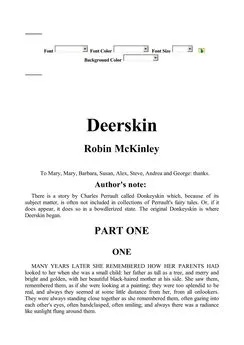Deerskin - Robin McKinley
- Название:Robin McKinley
- Автор:
- Жанр:
- Издательство:неизвестно
- Год:неизвестен
- ISBN:нет данных
- Рейтинг:
- Избранное:Добавить в избранное
-
Отзывы:
-
Ваша оценка:
Deerskin - Robin McKinley краткое содержание
Robin McKinley - читать онлайн бесплатно полную версию (весь текст целиком)
Интервал:
Закладка:
people, last of all looking in her nursemaid's face, who was as dazed as anyone else in the kingdom-as the king himself. She had worshipped the queen with every breath she took, and had sought the position of caring for her daughter because she was her daughter.
The princess was in a daze also, but her confusion had more to do with perplexity than with sorrow. For what she realized was that her mother's death had no effect on her, but only on those around her. But this was so amazing to her that her amazement looked like grief, had there been anyone to notice.
She had grown up understanding that almost all those around her, chiefly her nursemaid but also the maids and the occasional courtier or minister who thought it politic to visit her, and certainly her parents, on those rare occasions that she was summoned into their presence, desired her to be biddable. For the most part she had acquiesced in this. She knew no other children, and never guessed the noisy games that most children play; and she learned very young that when she cried or was cross she was likely to be left alone; and as she had so little companionship she was unwilling to risk the little. She could not remember her babyhood; her first memories were of her nursemaid telling her stories, stories about her mother and father in the years before she was born; her second memories were of asking for those stories to be retold.
Her first rebellion, although she did not know it, was in learning to read. She learned rather easily, which was remarkable, for the nursemaid was an even worse teacher than she was a scholar. With the curious stark comprehension of children, she knew that her nursemaid's reluctance to read stories from books was because she was not good at it, and that it would be as well not to tell her that it was otherwise with herself. But the princess had seized on this thing not commanded of her, unlike dancing and riding and deportment, and soon came to treasure it; for books were companionable.
Somehow the occasional ladies who wished to pet her-either for her own sake, or for the sake, as they hoped, of their husbands' careers-rarely came to see her more than a few times. The queen, the nursemaid told the princess reprovingly, when she showed signs of missing a very young and playful lady who had contrived to visit her nearly a dozen times before being banished as mysteriously as the rest, was very strict about who might be permitted to cultivate her only child. The young and playful lady had not only taught the princess games that involved running and shouting, but had brought her fresh new storybooks, and helped her to hide them from the nursemaid; and although the princess noticed that this seemed to make the lady unhappy, she refused to fell the little girl why. But the princess had let herself be consoled for this loss, for she was still very young, when the nursemaid look her on her lap and told again their favorite story.
She thought of that lady now; it had been years before she had quite given up the hope that she would see her again (though she never told her nursemaid this) and had looked around her, shyly but eagerly, on such state occasions as she attended on her parents, seeking one face amoung the many faces in the crowds gathered to pay her parents homage. But it was all so long ago now that the princess doubted she would recognize the lady's face even if she did see her again; and she would be older now, and perhaps no longer playful. Then she surprised herself by thinking that if she could remember the lady's name, she might ask for her. The surprise was so severe that any chance that she might recall the name she wished fled forever; and she sat very still, as if she might be caught out at something.
But she knew her mother's death had changed her position in the royal household, though she did not know how. It was enough, for the moment, that she no longer believed in the shining figures of her nursemaid's stories, though she dared not think why.
Something had happened to her the evening of her twelfth birthday, three years ago now, when she sat on the glittering chair and watched her parents dance. Some time during that long evening, after she had sent her prospective dancing-partners away, she had looked thoughtfully at her hands, with their clean nails and soft palms, and at her legs, hidden beneath their long skirt, and she had wondered, as a hero might wonder before stepping across the threshold of a great Dragon's lair, what these hands and legs might be capable of.
It was a question that had returned to her a number of times over the next weeks, making her restless and peevish; but when her nursemaid spoke to her sharply, she subsided, as she had always subsided, for she had no words for what she felt was trying to express itself. There was no outlet for the wondering, nor for the emotions that it caused; and her life did not change, nor had she any idea of how she might make a change, or what she might like that change to be. And so while she was aware of some quiet evolution going on in her heart and brain, she did not know what it was and, to a great extent, did not seek to know, for she could imagine no good coming of it. What the first twelve years of her life had taught her chiefly was patience, and so she held patience to her like a friend, and went on being quiet and biddable. One new pleasure she gave herself, and that was to observe what went on around her; and she began to have thoughts about the palace and the people in it that would have surprised her nursemaid very much.
But then the queen's illness overshadowed all else, and any idea, faint as it had been at its best, of trying to explain to her nursemaid what she was thinking about, what made her uneasy, faded to nothing, and she tried not to pursue these thoughts while the queen lay dying, for it seemed to her that it was disloyal. The fact that it did not feel disloyal to be anxious and preoccupied with her own thoughts while her mother lay dying distressed her; and the distress was real enough, and she clung to it.
She was sitting in a window seat, as she often sat, staring out of the window as she often stared, turning over her bewildering and possibly traitorous idea, and the even more bewildering ideas that fell from it, like sparks from a burning stake, all of which seemed somehow connected with that earlier wondering of what she might be capable of. She still could not imagine uttering any of her musings aloud; and she glanced down at her mourning clothes. The nursemaid sat by the cold hearth, hugging and rocking herself, absorbed in her own grief; dimly aware of the creature comfort of the presence of another human being, assuming that the princess was as mazed by grief as she was-no more and no less. That the princess was the queen's daughter left no special mark on her; all the nursemaid knew was that her own grief was overwhelming, and that she had no attention to spare from it.
The knock on the door surprised them both, for it was not time for a meal or a bath or a ladylike walk in the formal gardens; and they both started in their seats. The door was flung open after a minute of silence, and a footman stood there. The nursemaid fell out of her chair to curtsey, for this was an upper footman, and he did not look at all pleased with his commission. "Her highness's presence is requested in the receiving-hall. At once." He turned and left immediately. He did not close the door.
"Oh! Oh!" cried the nursemaid. The princess stepped down from tier perch and let the maid flutter around her, still murmuring, "oh, oh ---oh." The princess herself combed her hair, and asked her maid, in a clear, careful voice, to press her black ribbons for her, and shine the toes of her black boots, while she washed her face and put on her new black stockings. She was perfectly composed as she walked out of her chamber, the nursemaid still bobbing after her and murmuring, "Oh!"
The princess walked down the stairs, her boot-heels clicking to the first landing, for the final flight to the nursery was uncarpeted. She had consciously to recall the way to the receiving-hall, for she went there so rarely, and it was down and down long twisting corridors and more flights of stairs. The footman had, of course, not waited to escort her. She paused, hesitating, at a final corner, and looked round, and knew she had come the right way after all, for at the door of the receiving-hall the upper footman stood, still stiff with outrage at having to climb to a region of the palace where the stairs were uncarpeted, and with him were two lower footman and two pages.
The upper footman flung open the door for her without ever looking at her, and entered, and bowed, and stood aside; then the lower footmen entered as a pair, and parted, and faced each other across the doorway. The princess paused, waiting, but decided that perhaps it was her turn next, so she entered, with her chin up, and her steps were quite steady. The pause after the squad of footmen had prepared her entrance had done her no harm in the court's eyes; what she knew was the feeling of their gaze upon her, a feeling not unlike the prickly cling of cloth before a thunderstorm. She felt their awakening curiosity; they were wondering about her for the first time, she thought, wondering who she was and what she was worth. She wondered too. She was just fifteen years old; even her nursemaid had forgotten her birthday in grief for the dead queen.
One herald stood beside the dais where her father and his ministers sat, and one crouched at its foot with something, some pale lumpish bundle, in his lap. She walked calmly forward, not knowing what else to do, nor where the summons had come from, nor to what purpose. She went up to the dais and curtseyed to the floor, to her father; and looked up, and met his eyes. The blankness there parted for a moment, and she saw-she did not know what she saw, but it made her cold all over, suddenly, so cold that the sweat of terror broke out on her body. She stood up from her curtsey too hastily, and had to catch her balance with an awkward side-step.
There was a whisper behind her, among the court: a pity she is not more graceful.
Who has had the teaching of her? Such a drab little thing, such an odd child of such parents.
One of the ministers addressed her. "These heralds are come from King Goldhouse and Queen Clementina to offer their sorrow to us in our ... loss. And their son, the prince Ossin, has sent you a gift."
The standing herald came forward, and bowed to her, and handed her a piece of stiff paper, folded and sealed. She looked at the herald on the floor, and realized that what was on his lap was the rear parts of a dog; the head and forequarters were wedged under his arm. She took the paper and broke the seal.
"To the princess Lissla Lissar, from the prince Ossin, I give you greeting.
I have heard of your great grief and I am very unhappy for it. I do not know how I could bear it if my mother died.
My favorite bitch had her puppies a few weeks ago and I am sending you the best one. Her name is Ash, for her coat is the color of the bark of that tree. There are many ash trees here. She will love you and I hope you will be glad of her.
My highest regards and duty to you and your father. Ossin."
She looked up. She did not quite know what to do. The herald with the dog, who had children (and dogs) of his own, stood up, tucking the puppy firmly under the arm she was trying to disappear beneath. Her legs began a frantic paddling. He supported them with his other arm and slowly drew her out from hiding, turning her round to face the princess. The puppy bobbed in his grasp for a moment, but the princess had, as if involuntarily, taken a step forward, and reached out a hand.
The puppy caught the gesture, and large brown silvery-lashed eyes caught the glance of large dark-fringed amber-hazel eyes, and then the puppy began bobbing in good earnest, her ears flattening, her tail going like a whirlwind. The princess held out her arms, and the herald, smiling, lay the puppy in them, and the puppy thumped and paddled and kicked, and banged her nose against the princess's breastbone, licked her chin, and made tiny, urgent noises deep in her throat.
Читать дальшеИнтервал:
Закладка:








![Makenlo - Маг, Поедающий Книги. Главы 101-203 [некоммерческий перевод с корейского]](/books/1101097/makenlo-mag-poedayuchij-knigi-glavy-101.webp)

